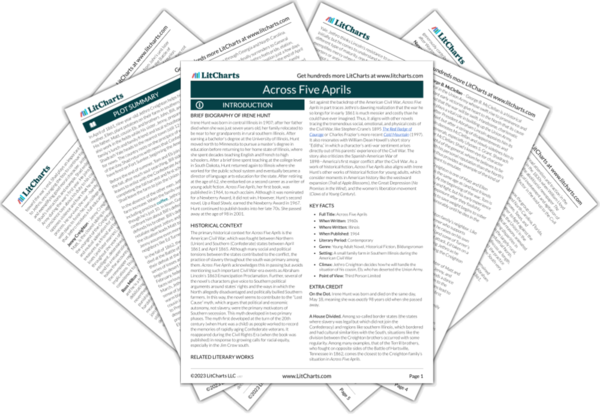George B. McClellan Quotes in Across Five Aprils
His eyes were wide and troubled with his thoughts. He had a high respect for education, for authority of men in high places, and yet the stories in the newspapers made him wonder. McClellan, the most promising young officer in his class at West Point, was now the general who either didn’t move at all or moved ineffectually; Halleck, the author of a book on military science, was now the author of boasts that somehow branded him as a little man, even to a country boy who was hungry for a hero. There were stories of generals jealously eyeing one another, caring more for personal prestige than for defeating the Confederates; there were Pope and Sheridan, who blustered; there was Grant and the persistent stories of his heavy drinking. Nowhere in the North was there a general who looked and acted the part as did the Confederates’ Lee and Jackson.

Unlock explanations and citation info for this and every other Across Five Aprils quote.
Plus so much more...
Get LitCharts A+It is unfortunate that congressmen and their ladies should have been deprived of this spectacle. There was drama here, I can tell them—thousands upon thousands of us crossing the Rappahannock with banners flying, drums rolling, and our instruments of death gleaming in the sunlight. They could have seen those thousands scrambling up the innocent-looking wooded hills and falling like toy soldiers brushed over by a child’s hand; thousands of young men whose dreams and hopes were snuffed out in a second and who will be remembered only as simple soldiers who fell in a cruel, futile battle directed by men who can hardly be called less than simple murderers.

George B. McClellan Quotes in Across Five Aprils
His eyes were wide and troubled with his thoughts. He had a high respect for education, for authority of men in high places, and yet the stories in the newspapers made him wonder. McClellan, the most promising young officer in his class at West Point, was now the general who either didn’t move at all or moved ineffectually; Halleck, the author of a book on military science, was now the author of boasts that somehow branded him as a little man, even to a country boy who was hungry for a hero. There were stories of generals jealously eyeing one another, caring more for personal prestige than for defeating the Confederates; there were Pope and Sheridan, who blustered; there was Grant and the persistent stories of his heavy drinking. Nowhere in the North was there a general who looked and acted the part as did the Confederates’ Lee and Jackson.

Unlock explanations and citation info for this and every other Across Five Aprils quote.
Plus so much more...
Get LitCharts A+It is unfortunate that congressmen and their ladies should have been deprived of this spectacle. There was drama here, I can tell them—thousands upon thousands of us crossing the Rappahannock with banners flying, drums rolling, and our instruments of death gleaming in the sunlight. They could have seen those thousands scrambling up the innocent-looking wooded hills and falling like toy soldiers brushed over by a child’s hand; thousands of young men whose dreams and hopes were snuffed out in a second and who will be remembered only as simple soldiers who fell in a cruel, futile battle directed by men who can hardly be called less than simple murderers.











